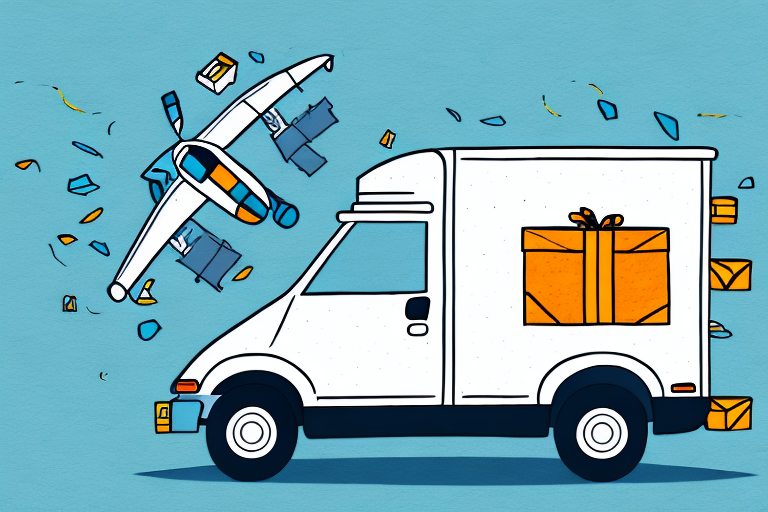How to Start a Courier Service: A Step-by-Step Guide
Courier services are a vital component of today’s economy, ensuring the timely delivery of goods and documents to customers across various locations. If you have a passion for logistics and are considering starting a courier service business, this comprehensive guide provides the essential information to help you launch and thrive in the competitive industry.
Understanding the Courier Service Industry
Before launching a courier service, it is crucial to gain a deep understanding of the industry. Courier services involve the transportation of various types of goods and documents from one location to another within specified timeframes. This service is particularly valuable for customers who need fast, efficient, and reliable delivery solutions.
The courier industry is highly competitive with established players, but there remains opportunities for new entrants to carve out a niche. According to IBISWorld, the courier and delivery services industry has seen steady growth, driven by the rise of e-commerce and increasing demand for same-day delivery options.
Key Factors in the Courier Industry
- Speed and Reliability: Customers prioritize quick and dependable delivery services.
- Technology Integration: Efficient tracking systems and route optimization software are essential.
- Regulatory Compliance: Adhering to industry regulations and obtaining necessary permits is mandatory.
Investing in the right technology can streamline operations, enhance customer satisfaction, and provide a competitive edge. Staying updated with industry trends and regulatory changes is also crucial for maintaining compliance and competitiveness.
Conducting Market Research for Your Courier Service Business
Thorough market research is essential to understand the demand, competition, and customer needs within the courier service sector. This involves analyzing competitors, identifying market gaps, and comprehensively understanding your target audience.
Steps to Effective Market Research
- Analyze Competitors: Identify key players in your desired market and assess their strengths and weaknesses.
- Identify Market Gaps: Look for unmet needs or underserved areas that your service can address.
- Understand Customer Needs: Determine what your potential customers are seeking in a courier service, such as speed, cost, or specialized handling.
Utilizing tools like SurveyMonkey for customer surveys or engaging in focus groups can provide valuable insights to tailor your services effectively. Incorporating data-driven decisions will enhance your business strategy and operational effectiveness.
Defining Your Target Audience and Delivery Services
Identifying and understanding your target audience is fundamental to offering services that meet their specific needs. Whether catering to individual consumers, small businesses, or large corporations, defining your audience helps in customizing your delivery offerings.
Types of Delivery Services
- Same-Day Delivery: Ideal for urgent shipments within urban areas.
- Next-Day Delivery: Suitable for slightly less urgent deliveries over a broader geographic area.
- Standard Delivery: Cost-effective option for non-urgent shipments.
Consider the geographic distribution of your target audience when selecting delivery services. For instance, urban areas may have higher demand for same-day delivery, whereas rural regions might benefit more from next-day or standard delivery options.
Identifying Startup Costs and Budgeting for Your Courier Service Business
Accurate budgeting is essential to ensure the financial viability of your courier service. Startup costs will vary based on the scale of operations, the types of services offered, and the equipment required.
Major Startup Expenses
- Vehicles: Purchasing or leasing vans, bikes, or trucks depending on the delivery scope.
- Technology: Investing in tracking and route optimization software.
- Insurance: Comprehensive coverage for vehicles, cargo, and general liability.
- Permits and Licenses: Acquiring necessary legal permits to operate.
Additionally, allocate funds for marketing and advertising to promote your services and attract customers. Managing these expenses carefully will help maintain profitability and support sustainable growth.
Choosing a Legal Structure for Your Courier Service Business
Selecting the appropriate legal structure is a critical decision that impacts taxes, liability, and management of your courier service.
Common Legal Structures
- Sole Proprietorship: Simple setup with full control but personal liability.
- Partnership: Shared ownership with partners, distributing responsibilities and liabilities.
- Limited Liability Company (LLC): Offers liability protection with flexible management.
- Corporation: Suitable for larger businesses with shareholders and more complex structures.
Consider consulting with a legal professional or a business advisor to determine the best structure that aligns with your business goals and risk tolerance.
Registering Your Courier Service Business with Relevant Authorities
Once you have selected a legal structure, the next step is to register your business with the appropriate government authorities. This process ensures that your courier service operates legally and complies with all regulatory requirements.
Essential Registration Steps
- Business Registration: Register your business name and obtain a business license.
- Tax Registration: Obtain an Employer Identification Number (EIN) for tax purposes.
- Permits and Licenses: Secure required permits based on the types of deliveries, such as hazardous materials permits if applicable.
Each region may have specific requirements, so it is important to research local regulations or consult with a legal advisor to ensure full compliance.
Acquiring Necessary Permits and Licenses for Your Courier Service Business
Operating a courier service legally requires obtaining various permits and licenses, which can vary based on location and service offerings.
Common Permits and Licenses
- Commercial Driver’s License (CDL): Required for operating certain types of vehicles.
- Vehicle Permits: Registration and permits for each delivery vehicle.
- Hazardous Materials Permit: Necessary if transporting hazardous goods.
Regularly updating and renewing these permits is essential to avoid legal issues and ensure smooth operations. Resources like FMCSA provide detailed information on federal requirements.
Creating a Comprehensive Business Plan for Your Courier Service Business
A solid business plan serves as a roadmap for your courier service, outlining your business strategy, financial projections, and operational plans.
Components of a Business Plan
- Market Analysis: Insights into industry trends, target market, and competition.
- Financial Projections: Budgeting, revenue forecasts, and break-even analysis.
- Marketing Strategies: Plans for promoting your services and attracting customers.
- Operational Plan: Daily operations, technology needs, and staffing requirements.
Including detailed sections on legal requirements and technological infrastructure ensures that your business is well-prepared to meet operational challenges. Utilizing resources like the Small Business Administration (SBA) can assist in developing a robust business plan.
Sourcing Funding Options and Securing Startup Capital
Securing adequate funding is crucial for launching and sustaining your courier service business. Various funding options are available, each with its own benefits and requirements.
Funding Options
- Bank Loans: Traditional loans with competitive interest rates, suitable for established credit histories.
- Venture Capital: Investment in exchange for equity, ideal for high-growth potential businesses.
- Personal Savings: Utilizing personal funds to maintain full ownership.
- Crowdfunding: Raising small amounts of money from a large number of people, typically via online platforms like Kickstarter.
Carefully evaluate each option to choose the one that best aligns with your business needs and financial situation. A well-planned funding strategy will support your startup costs, including vehicle purchases, technology investments, and marketing efforts.
Recruiting and Training Staff for Your Courier Service Business
The success of your courier service heavily relies on the quality and reliability of your staff. Recruiting the right team and providing comprehensive training ensures high service standards and customer satisfaction.
Hiring Best Practices
- Define Roles: Clearly outline job responsibilities for drivers, dispatchers, and support staff.
- Screen Candidates: Conduct thorough background checks and assess relevant experience.
- Provide Training: Offer training on handling different types of deliveries, customer service, and safety protocols.
Investing in employee training programs enhances operational efficiency and fosters a culture of excellence within your business.
Setting Up an Efficient Dispatch System for Timely Deliveries
An efficient dispatch system is critical for managing deliveries, optimizing routes, and ensuring timely service. Implementing robust dispatch software can significantly enhance your operational efficiency.
Features of an Effective Dispatch System
- Real-Time Tracking: Monitor the location and status of deliveries in real-time.
- Route Optimization: Automatically calculate the most efficient delivery routes to save time and fuel.
- Communication Tools: Facilitate seamless communication between dispatchers and delivery personnel.
Utilizing advanced dispatch systems not only improves delivery times but also enhances customer satisfaction by providing accurate tracking information.
Securing Insurance Coverage for Your Courier Service Business
Insurance is a fundamental aspect of risk management in the courier industry, protecting your business from potential losses and liabilities.
Essential Insurance Types
- Commercial Vehicle Insurance: Coverage for vehicles used in your courier operations.
- Cargo Insurance: Protection for goods being transported against damage or loss.
- General Liability Insurance: Covers legal claims related to accidents, injuries, or damages.
Consulting with an insurance professional can help you determine the appropriate coverage levels and policies tailored to your business needs.
Implementing Marketing Strategies to Promote Your Courier Services
Effective marketing strategies are essential to build brand awareness, attract customers, and drive business growth in the competitive courier service market.
Marketing Tactics
- Online Advertising: Utilize Google Ads and social media platforms to reach a wider audience.
- Social Media Marketing: Engage with potential customers through platforms like Facebook, Instagram, and LinkedIn.
- Local Advertising: Invest in local newspapers, radio, and community events to increase visibility.
- Referral Programs: Encourage existing customers to refer new clients by offering incentives.
Developing a strong online presence through a professional website and search engine optimization (SEO) can also drive organic traffic and enhance your market reach.
Establishing Partnerships with Businesses
Forming strategic partnerships with businesses that require delivery services can help you expand your customer base and increase revenue streams.
Potential Business Partners
- E-Commerce Platforms: Partner with online retailers to handle their order deliveries.
- Medical Facilities: Provide reliable transportation for medical supplies and documents.
- Law Firms: Facilitate the secure delivery of legal documents and materials.
- Printing Companies: Deliver printed materials promptly to clients.
Building strong relationships with these businesses can lead to long-term contracts and consistent delivery volumes, ensuring a stable revenue flow.
Evaluating the Success of Your Courier Service Business Through Performance Metrics
Measuring and analyzing key performance indicators (KPIs) is essential to assess the effectiveness and profitability of your courier service business.
Key Performance Metrics
- Delivery Times: Track the average time taken to complete deliveries.
- Customer Satisfaction Rates: Use surveys and feedback forms to gauge customer happiness.
- Revenue Growth: Monitor monthly and annual revenue to evaluate business growth.
- Profitability: Assess net profit margins to ensure financial health.
Regularly reviewing these metrics allows you to identify areas for improvement, adjust strategies, and make informed business decisions.
Managing Operational Expenses to Maintain Long-Term Profitability
Efficiently managing your operational expenses is crucial for sustaining profitability in the courier service industry.
Strategies for Expense Management
- Monitor Fuel Costs: Implement fuel-efficient driving practices and optimize routes to reduce fuel consumption.
- Vehicle Maintenance: Regularly maintain vehicles to prevent costly repairs and downtime.
- Staff Salaries: Balance competitive wages with budget constraints to retain quality employees.
- Technology Investments: Allocate funds to essential technologies that enhance efficiency and reduce long-term costs.
By keeping a close eye on these expenses and identifying opportunities for cost savings, you can enhance your business’s financial stability and profitability.
Innovating to Stay Ahead of Competitors in the Evolving Industry
The courier service industry is continually evolving, influenced by technological advancements and changing customer expectations. Innovation is key to staying competitive and meeting market demands.
Innovative Approaches
- Adopting Advanced Technology: Use AI and machine learning for route optimization and predictive maintenance.
- Eco-Friendly Solutions: Implement green practices such as electric vehicles or carbon-neutral delivery options.
- Enhanced Customer Service: Provide advanced tracking features and personalized service offerings.
- Expanding Service Offerings: Introduce specialized delivery services, such as cold chain logistics for perishable goods.
Keeping abreast of industry trends and continuously seeking ways to improve and differentiate your services will help ensure your courier service remains competitive and relevant.
Navigating Legal Challenges in Running a Successful Courier Service Business
Operating a courier service involves adhering to various laws and regulations. Navigating these legal requirements is essential to avoid disputes and ensure smooth operations.
Common Legal Considerations
- Compliance with Transportation Laws: Adhere to federal and state regulations governing commercial transportation.
- Data Privacy: Protect customer information and comply with data protection laws.
- Employment Laws: Follow labor laws related to hiring, wages, and workplace safety.
- Contractual Agreements: Ensure clear and enforceable contracts with clients and partners.
Consulting with a legal expert can help you stay informed about relevant laws and address any legal challenges that arise during your business operations.
Scaling Up Operations to Meet Increasing Demand and Expand into New Markets
As your courier service business grows, scaling operations effectively is crucial to accommodate increased demand and explore new market opportunities.
Steps to Scale Your Business
- Invest in Additional Vehicles: Expand your fleet to handle higher delivery volumes.
- Hire More Staff: Recruit additional drivers, dispatchers, and support personnel to manage growth.
- Expand Geographic Reach: Enter new regions or cities to tap into additional customer bases.
- Develop Strategic Partnerships: Collaborate with larger businesses or franchises to increase delivery contracts.
Strategic planning and resource management are essential when scaling to ensure that growth is sustainable and does not compromise service quality.
Starting and running a successful courier service business requires dedication, strategic planning, and continuous improvement. By following this comprehensive guide, you are well-equipped with the knowledge and tools needed to establish a thriving courier service in today’s dynamic market.




















